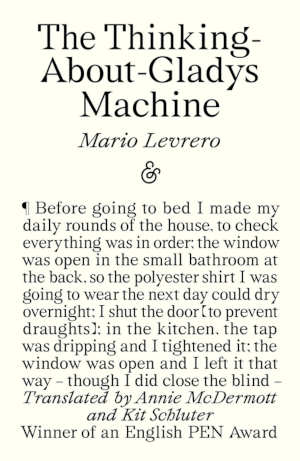The Thinking-About-Gladys Machine
- Auteur: Mario Levrero (Uruguay)
- Soort boek: verhalen, debuut
- Origineel: La máquina de pensar en Gladys (1970)
- Engelse vertaling: Annie McDermott, Kit Schluter
- Uitgever: And Other Stories
- Verschijnt: 15 oktober 2024
- Omvang: 176 pagina’s
- Uitgave: paperback / ebook
- Prijs: € 16,99
- Boek bestellen >
Mario Levrero The Thinking-About-Gladys Machine recensie en review
- “These stories contain Levrero’s most secret side and, in a way, 80% of the DNA that made him an extraordinary writer.” (Fabián Casas, Argentijnse schrijver)
- “One of Latin American literature’s most balanced and well-constructed books.” (Elvio Gandolfo, Argentijnse schrijver)
Flaptekst van het debuut van de Uruguayaanse schrijver Mario Levrero
Widely viewed as one of the most inventive bodies of work from 20th-century Latin America, Mario Levrero’s writing is distinguished by its bounteous imagination. In none other of the author’s books is this imagination so clearly on display as in The Thinking-About-Gladys Machine, his 1970 debut collection of stories. It gathers a variety of Levrero’s earliest and most formally inventive publications, ranging from dazzling single paragraph micro-fictions à la Donald Barthelme to adventurous Lewis Carroll-esque tales of forty pages’ length.
From the shocking surreal twists of ‘Beggar Street’ to the Escher-like grammatical maze of ‘The Boarding House’, via the pseudo-fairy tale classic ‘The Basement’, this book explores uncanny domestic spaces, using the structures of the stories themselves as tools for re-inventing narrative possibility.
Mario Levrero was born in Montevideo, Uruguay, on 23 january 1940 and died there on 30 august 2004. Levrero was a photographer, bookseller, comics scriptwriter, humorist, crossword author, and creator of brain games. He wrote twelve novels and several short story collections and it was not long before he gained cult status amongst readers in Uruguay and Argentina, despite keeping a low profile. He has inspired Latin American writers such as Rodolfo Fogwill, César Aira and Alejandro Zambra. In 2000 he was awarded the Guggenheim grant that allowed him to complete work on The Luminous Novel, which was published posthumously.
